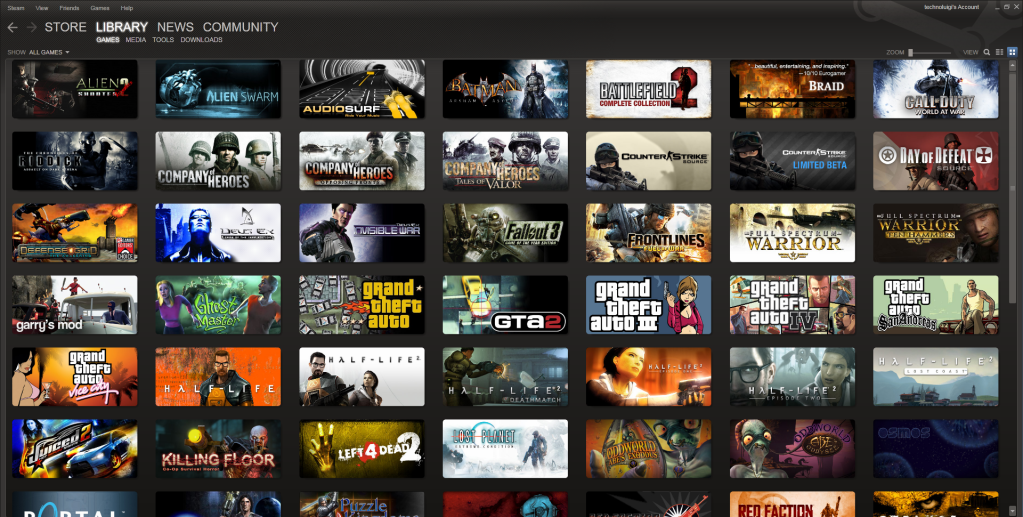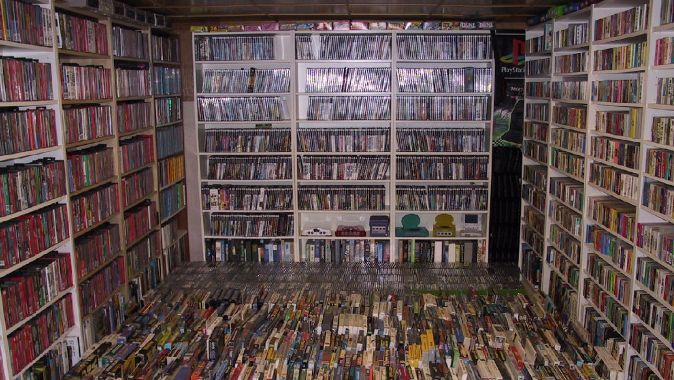This is a debate that has been raging in the gaming community for some time now. As time goes by, more and more games are being released digitally. Some games ONLY exist in digital form. Every day it's looking more like this industry will become all or mostly digital. Is this a good or bad thing? Let's look at some of the advantages and disadvantages of an all-digital future.
A bit of a disclaimer before we dive in. By all-digital I mean a future where all or most games are either downloaded to your console's hard drive or where you can play games via a streaming service like Playstation Now. Got it? Then let's start things off with some of the pros:
The Pros
No need to leave the couch.
This is the example that most people cite as being a big advantage to an all-digital future. Traditionally, gamers would have to commute to their nearest video game store to buy a game. Some would wait on long lines to get a game at midnight and all of us have had to deal with crappy weather just to get our hands on a game. Digital downloads take the uncertainty of leaving your home out of the equation. It's scary out there! Seriously though, the convenience of purchasing a game and having it download directly to your hard drive can't be understated. Current generation consoles allow you to play games as they download which makes things even sweeter.
Your entire game collection available at the press of a button
Right now, most of us have a sizable collection of games. To play different titles we have to get up and swap disks in and out of our consoles. Having all of your games digitally in one place, whether it be your hard drive or a cloud server, makes things so much easier. People can play one game then switch to another without having to move more than their thumbs. The advent of streaming services like PlayStation Now will make having an even larger game collection much simpler to manage.
Saves physical space
While having a big collection of games to stare at and show off is cool, having an ever expanding collection takes up considerable physical space. You can save a lot of room by having all of your games exist inside of your small hard drive or in a cloud server. You'd also be doing your part to help the environment since you won't have to throw out those plastic boxes with their paper manuals and covers. Think of all the things you can fit into your room without having all of those games taking up space.
Cheaper prices
This one isn't exactly set in stone but with games being all-digital, there would be no need to match the price of physical games and therefore, the prices of digital games can come down. A perfect example of cheaper digital prices can be found with the many sales we see for digital games. Steam has them frequently as does the PlayStation Network and Xbox Live. Without physical copies there is no reason for companies to keep games at $60 (other than greed).
Your collection is backed up
Have you ever lost a game? Had it stolen or destroyed? Having physical copies means that there is always the possibility that you could lose your game in some form or fashion. However, this is something that you don't need to worry about if your entire collection exists in digital form. If the worst should happen and your place burns down, you'd have to replace a lot of things but not your video games. You don't have to worry about getting disks scratched or having one of your pets do some unmentionable act to your precious games. Having games saved digitally means no more worrying about what may physically happen to them.
Now that we've seen some of the pros, let's look at some cons to an all-digital future:
The Cons:
Slow internet speeds
Let's just get the biggest con out of the way. The prospect of an all digital future is severely hampered by unreliable internet speeds. If your internet provider isn't exactly one of the best out there then you'd be SOL if all or most games were digital. As of right now, America has some of the slowest internet speeds on Earth and many of us have to wait long periods when downloading games. Go and download DC Universe Online and tell me how long that takes you. Let's not forget about those who don't have access to the internet. An all digital future pretty much tosses them to the side.
Games no longer belong to you
While it's convenient to have all of your games inside of a digital space, the truth is that they don't really belong to you. You have no physical copy and therefore you're left at the mercy of publishers who could pull games at any given moment. Yes, you paid for the game but since there is no physical copy the companies who released them could do whatever they want with them. Even if you have games in your hard drive, a publisher could still restrict you from playing them. The owner is the publisher and not you.
Nothing to share or sell back
One of the most effective ways to spread the word about video games is to share them with your friends. This is how a lot of us got to play many games and still do. With no physical copies you can no longer lend games to people for them to try out. There is also the fact that you can't sell a digital game back since it's not something tangible. You may not be able to make a lot of money back from selling your used games but you get something in return at least.
Nothing to hold onto
While saving shelf space is nice, there is something to be said about actually having a physical video game collection to look at. I myself am a collector at heart and downloading a game isn't nearly as satisfying as actually having something to hold in my hands. You can't have collector's editions with unique boxes and manuals in digital form either. This also hurts the collector's market which thrives on buying and selling rare copies of video games.
Market saturation
We could see big publishers like Electronic Arts (Origin), Ubisoft (uPlay) and Square-Enix (Project Flare, which already in motion) decide to cut out the middle-men console manufacturers like Sony, Microsoft and Nintendo and release games on their own platform. How would they do this? Most likely via some kind of applications in smart TVs or mobile devices, since remember anything with a screen and an internet connection could essentially get a game delivered to it.
Although internet speeds are slow now, they will be much faster in five to ten years. PlayStation Now, like video service Netflix, will be able to work with internet speeds of 5mbps so it's not hard to imagine how apps similar to it will run as internet speeds increase.
Using these kinds of delivery methods a publisher could allow people play their games without having to release it on a console. While this sounds good on the surface, imagine having to pay separate subscriptions for EA, Ubisoft and Square Enix games. This could potentially saturate the market with countless publishers releasing games on their own; games set to whatever prices they want. Although competition could keep publishers from overpricing their titles, people would probably have to pay a lot of money for all of these subscriptions.
Final thoughts
There are many more examples that I could have cited but these are the main ones that sprung up when I asked people about this subject. Personally, I'm kind of skeptical and worried about an all digital future. While this is the way the industry seems to be headed, I'm not sure if I'm 100% comfortable with it. My main gripe is something I mentioned above, that the games don't actually belong to you. If there was a guarantee that a game I downloaded digitally would be accessible to me forever that would be great. Unfortunately, that will never be a reality and the ultimate ownership of these games lies with the publishers or whichever digital server is hosting them.
I do have to say that, while this future seems to be inevitable, I don't believe that physical copies will ever completely go away. For example, people still buy vinyl records even though most don't own vinyl players. Why do they buy them? For the purposes of collecting something rare. An all-digital future could actually be a boon for the collector's market if only a handful of physical copies are printed.
This future is still a long ways out considering how shoddy internet connections are. Those who are against an all-digital future shouldn't be too worried just yet. However, this will come to pass within the next ten years or so. Some think it will happen even sooner than that. This current console generation could possibly be the last one to have physical games be the standard. The time may come when future consoles have no disk drives at all.
Again, this seems to be the way that the industry is headed so it's best to accept it and not complain about something that you can't really change. But what do you think of an all-digital future? Sound off in the comments below and let us know if you'll embrace or resist a digital-only world.





